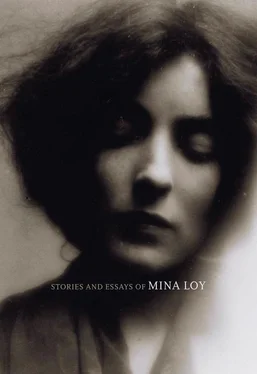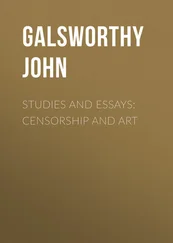Mina Loy - Stories and Essays of Mina Loy
Здесь есть возможность читать онлайн «Mina Loy - Stories and Essays of Mina Loy» весь текст электронной книги совершенно бесплатно (целиком полную версию без сокращений). В некоторых случаях можно слушать аудио, скачать через торрент в формате fb2 и присутствует краткое содержание. Год выпуска: 2011, Издательство: Dalkey Archive Press, Жанр: Современная проза, на английском языке. Описание произведения, (предисловие) а так же отзывы посетителей доступны на портале библиотеки ЛибКат.
- Название:Stories and Essays of Mina Loy
- Автор:
- Издательство:Dalkey Archive Press
- Жанр:
- Год:2011
- ISBN:нет данных
- Рейтинг книги:3 / 5. Голосов: 1
-
Избранное:Добавить в избранное
- Отзывы:
-
Ваша оценка:
- 60
- 1
- 2
- 3
- 4
- 5
Stories and Essays of Mina Loy: краткое содержание, описание и аннотация
Предлагаем к чтению аннотацию, описание, краткое содержание или предисловие (зависит от того, что написал сам автор книги «Stories and Essays of Mina Loy»). Если вы не нашли необходимую информацию о книге — напишите в комментариях, мы постараемся отыскать её.
Stories and Essays of Mina Loy
Stories and Essays of Mina Loy — читать онлайн бесплатно полную книгу (весь текст) целиком
Ниже представлен текст книги, разбитый по страницам. Система сохранения места последней прочитанной страницы, позволяет с удобством читать онлайн бесплатно книгу «Stories and Essays of Mina Loy», без необходимости каждый раз заново искать на чём Вы остановились. Поставьте закладку, и сможете в любой момент перейти на страницу, на которой закончили чтение.
Интервал:
Закладка:
“I know I promised to pay the rent,” she reiterates, “But I am really under no obligation — Cassy is no longer the girl I could be friendly with — she’ll never again be able to mix with decent people after that low crowd she’s got in with so deep — she’s become just like them — ”
“On the contrary,” countered Mrs. Nome, in an absent-minded impulse, ‘in spite of all’ to stick up for her offspring—“it was only the other day she told me how on finding herself once more in the Manhattan monde , she was surprised how easily she readapted.”
III. Mrs. Nome
Yet for Mrs. Nome, and others also remembered it, there was a sweetness at the core of Cassandra. To this sublimely dulcet nucleus clung the vindicatory faith of this mother, although in its occasional effusion it never reached to her. The beneficent upsurge would well up, overbrim pouring itself in an angelic graciousness on her casual acquaintances. In spite of her having, herself, so fastidiously selected the pedigrees of the pets with which her mother had delighted companion her — it was as if among moral humans, her heart craved curs and mongrels — to gather them in her arms and rudely protect them from a woman intent on doing them (with herself) some unguessable harm. As if, identifying herself with them she must vilify her mother on their behalf.
Mrs. Nome perhaps plausibly suspected that the fleshly bond between mother and daughter does sometimes deposit disgust in the daughter’s subconscious — that this might warrant the young withholding their sex confidences from their progenitors. This, she had modified, might, on the other hand, be due to the average parent having reduced “sex” to the humdrum atmosphere of disappointment pervading their home or degraded it in the dirt of false proprieties, contrasting so drastically with the budding faith in the life of their offspring.
— But was this disgust?
The sex-conversation of hospital nurses is even notoriously practical. And this woman who sniffed at her daughter in an effort to disparage the object of her rejected love for her alleviation—“Why, Bundy wasn’t even man enough to get you pregnant”—to her bulge of hip and bosom the inaccessible Cassandra resorted as to the uttermost fount of the humanities.
Had her involvement in the hideous carnality of that prenatal murder endowed her with some warm pulsating motherhood congenial to Cassandra? A woman convinced that Cassandra’s adoration of Schwartz was merely “pique” for his chosen girlfriend.
Mrs. Nome, repudiated mother, listened in an amazed agony as Cassandra lashed her the conceptual mother with hideous insults, while hugging close in her torn armchair, the mother of her selection. Their faces pressed together, the younger etiolate, the elder slightly bloated with her specialised contact with life — — Mop seemed to be discreetly covering a bed-pan she might carry as offertory to her own biological gods. .
Cassandra in some crafty excitement this woman alone she elected as worthy to share with her — ever more agitated, insisting; Mop, ever so evasively placating — the girl almost hilariously angry; each, although obviously at odds, fully enjoying a tussle in cupidity.
Of what nature, Mrs. Nome wondered, was this transferred filial devotion, that slid so wantonly from lip to ear, that leaned with such suspecting trust upon this stranger’s obesity, this gleam of parity in point of view, that suffused Cassandra with a tittering affection?
My presence, mused Mrs. Nome, in the physical world seems a signal for conspiracy; but in the ideological world how gloriously all pernicious sociability turns to my advantage as if — eliminating the dross from actuality one extracted a supernal essence.
It is when my helplessness allowing me to be crushed, leaves me not even the power to resist; when the wonder-worry of self accusation having failed to solve the mystery of my responsibility;— Pain and penury, the bruises and denunciations drop from me. Something innate to myself has all the while had no share in the evil events as if the arena of embroilment rejected this over-anxious outsider’s intrusion—
I am left insensate, anaesthetised by that secret essence human society unknowingly distils for me.
“Here,” pressing her hand to her brow, “where I find myself so ‘otherwise’ alone — and invulnerable,” said Mrs. Nome gazing somewhat witlessly upon me—“from some vast distance I have all the same been audience to The Most Beautiful love-affair the passions of our world have ever brought about.”
THE CROCODILE WITHOUT ANY TAIL
Once upon a time there lived a crocodile in a river. All day long he lay pretending to be an island and longing for the little children coming home from school.
One day a little boy was running along the bank of the river and the crocodile thrust his nose out of the rushes, and — nearly — snapped off the little boy’s leg.
All the children were very sad. They thought they would be much happier playing by the river if there was no crocodile there. So they went to the fairy and asked her what to do.
“A very simple matter,” said the fairy, “what you need to do is to pull out all the crocodile’s teeth.”
“How?” said the children.
“My dears,” said the fairy, “if you like I will do it for you. I can make myself invisible which is far the safest way.”
That very night the fairy flew into the crocodile’s mouth while he was snoring, and gently drew out all his teeth with a bone-magnet .
He felt nothing. He went on peacefully dreaming of Charley-chops and Sirloin of Sammy and it was only at sunrise next morning that he awoke to find that a deep change had come over his nature. Somehow or other he felt much more tender and when later in the morning the little children passed him on their way to school, he felt that in the future he could only want to kiss them.
For the first time he felt lonely too, and wished that he had some kind friends, on whom he might in times of trouble, rely.
The land seemed to him suddenly much more attractive than the river which had never happened before.
When the children came back from school they wanted to see how the crocodile looked without his teeth.
He greeted them with the kindest smile, and offered to give them a ride on his back.
The gentle crocodile floated down the river with half a dozen darlings shouting “Gee Up” and flogging him with grass.
Which made another crocodile with teeth so jealous that he bit off his tail the same night.
The children said, “Oh poor crocodile! We will make you a kite tail.” So they made him a tail of tufts of lovely pink and yellow paper.
When the wind rose the crocodile rose and went sailing over the house-tops with his tail floating. But when the wind dropped he dropped onto a kitchen chimney pot.
The children brought a long ladder to save the crocodile and they were only just in time for a spark from the chimney had set fire to the paper tail and they had to cut it off with a pocket-knife.
The children and the crocodile were now the greatest friends, and the children called the crocodile Grandpa and introduced him to their funny Mamma.
Their Mamma was funny because she was never surprised. She loved, she said, to see the children “express” themselves. And as she had nothing to do but ring for the maid to clear up after them, there was really no reason why they should not.
The funny Mamma said she was pleased to meet Grandpa and asked if he took sugar in his tea.
She also helped the children to throw the buns into his mouth. They all had a delightful time, and the funny Mamma said, “I think if you were to attach a Christmas tree to the crocodile for his new tail he would be both useful and ornamental.”
Читать дальшеИнтервал:
Закладка:
Похожие книги на «Stories and Essays of Mina Loy»
Представляем Вашему вниманию похожие книги на «Stories and Essays of Mina Loy» списком для выбора. Мы отобрали схожую по названию и смыслу литературу в надежде предоставить читателям больше вариантов отыскать новые, интересные, ещё непрочитанные произведения.
Обсуждение, отзывы о книге «Stories and Essays of Mina Loy» и просто собственные мнения читателей. Оставьте ваши комментарии, напишите, что Вы думаете о произведении, его смысле или главных героях. Укажите что конкретно понравилось, а что нет, и почему Вы так считаете.












